The Yorkshire couple using artisan skills in a modern age
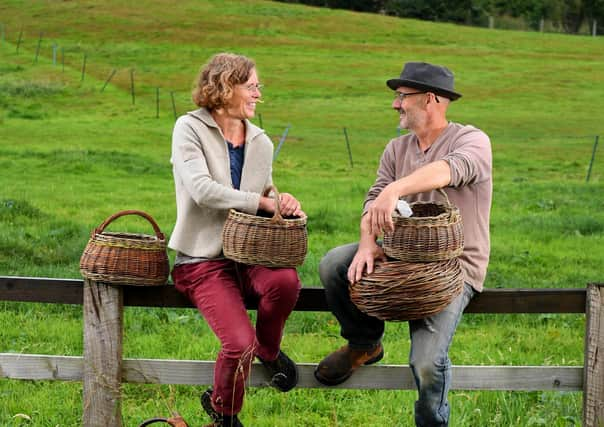

There was a time when basket weaving and fence making were not seen as skilled work. Most farm workers could turn their hand to them but now they are viewed as artisan crafts. Two people trying to keep these skills alive are Geoff North and Angela Cole. Angela had always been interested in being creative but life took her in a different direction and instead she went into care work. “I soon realised the therapeutic nature of crafting and would introduce it into my work to help the people I cared for by holding craft workshops. Then I decided that I really wanted to do it for me rather than other people.”
Angela took a course in traditional furniture making. She invested in a foot-powered pole lathe and made a Windsor chair without any power machinery and it now has pride of place in her kitchen.
Advertisement
Hide AdAdvertisement
Hide Ad“I have always been very interested in the environment and conservation and so I decided to make a chair without power. It was incredibly time-consuming and challenging and I realised that it wasn’t commercially viable and at the end of the day I had to make a living.”
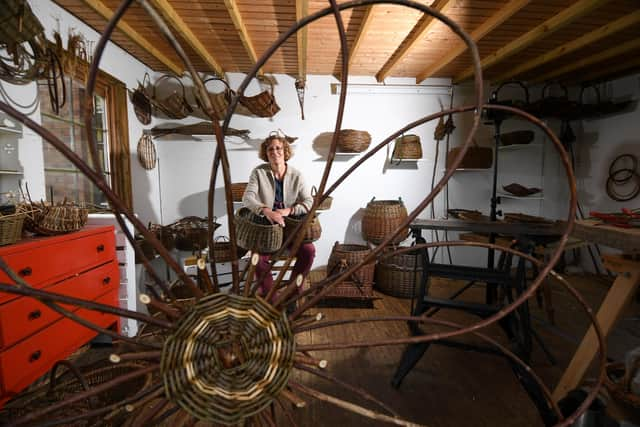

She had just started making the chair when she met Geoff, who had been working on the markets at the time, as he recalls. “I’d had enough of that and I had always been interested in artisan crafts.”
When Angela was asked to give a talk at a craft fair in Ealing, Geoff went with her. “There was someone at the craft fair making wooden hurdles, and I said to Geoff that he could easily do that,” says Angela.
“I’d never seen a hurdle before – it was a bit of a light bulb moment,” says Geoff. “I have a friend who’d made a couple of hurdles and he said he’d show me how to make them.”
Advertisement
Hide AdAdvertisement
Hide AdThe hurdles that Geoff now makes are not the sort of thing athletes (or horses for that matter) jump over, they are traditional fences woven from hazel.
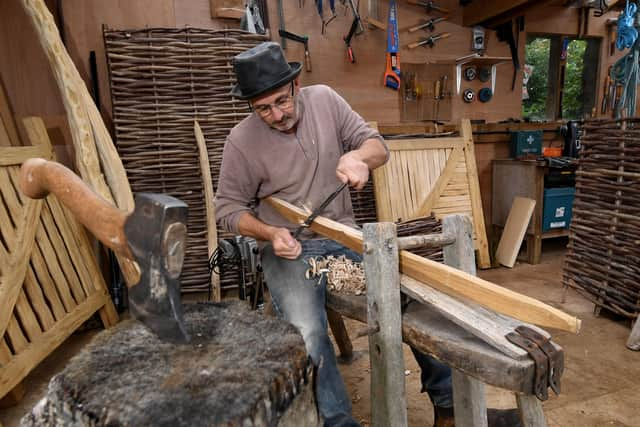

The interest progressed to Geoff learning how to make gates and green oak frames and hurdles, which are fences made from woven haze. Eleven years ago the couple set up Yorkshire Hurdles from workshops at their home near Malton. Their customers now include RHS Harlow Carr, Rudding Park Hotel and the Yorkshire Wildlife Trust as well as many private clients.
The weaving of hazel hurdles is a traditional skilled craft which would have been commonplace in the past. They would have been made by most agricultural workers as fencing, but, like many artisan crafts, modern, mass-produced alternatives took over and the skill was all but lost.
“It fascinates me that demand for these types of traditional wooden crafts is on the increase,” says Geoff. “People nowadays seem to want something different from the machine-made, mass-produced fencing. They want something a bit different and something more natural and sustainable. But some people don’t realise that as a result of the artisan, time-consuming nature of making them, they cost more.”
Advertisement
Hide AdAdvertisement
Hide AdGeoff and Angela make all their products from scratch, even cutting much of the wood and willow they use from managed coppice woodland.
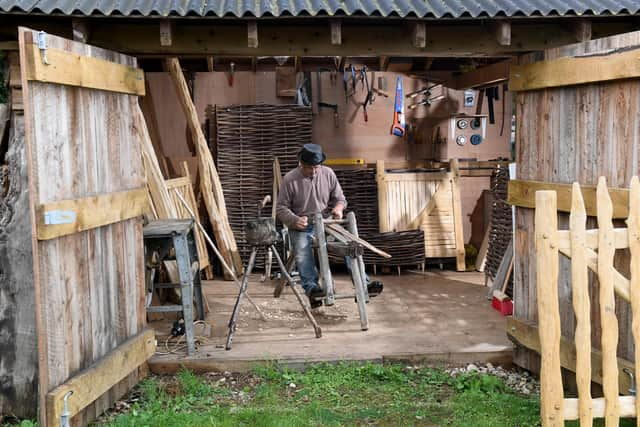

The business is based at their home in the village of Westow. They have their own separate workshops and both like to work outside when the weather is suitable, so that they can enjoy the stunning countryside views.
“We were lucky during lockdown as we are pretty isolated here in any case,” says Angela. The couple have two children, Freya and John.
“I work mainly in hazel, oak and sweet chestnut,” says Geoff. “Some of the wood comes from the trees we coppice. We manage woodland for other people and quite often the arrangement is management for materials.” The sweet chestnut that he uses is from Herefordshire and the green oak from Boroughbridge, while some of the willow is from Somerset.
Advertisement
Hide AdAdvertisement
Hide AdThey even travel to Nottinghamshire where they have permission to coppice an estate owned by Nottinghamshire Wildlife Trust.
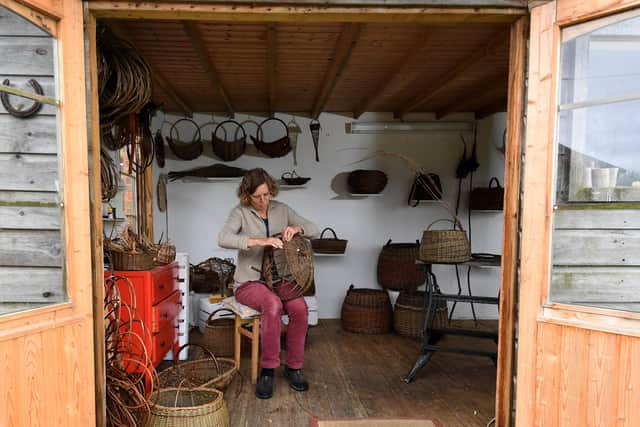

The flexible rods are bundled up and taken to the yard where they are split with a bill hook and woven into panels.
By late spring, when all orders must be complete, the hazel is fenced against deer and left to grow again. Hazel hurdles are durable for five to 10 years, and are particularly suitable for breezy sites, as they filter the wind.
“Most of the coppicing is done in the winter so we are used to being out in all weathers,” says Angela.
Advertisement
Hide AdAdvertisement
Hide Ad“We spend quite a lot of time grading the wood and sorting it out into bundles of what it might be best used for.
“When we first started we did have quite a bit of waste, which goes against our ethos but now we use virtually everything.”
They also sell the fruits of their coppicing direct from their home and have seen demand for both these and their garden products increase during lockdown.
“People had more time and wanted to improve their homes and gardens and we really noticed an upturn in business,” says Angela, who taught herself willow weaving and now makes everything from sculptures to baskets (www.yorkshirewillowbaskets.co.uk).
Advertisement
Hide AdAdvertisement
Hide AdShe started making garden obelisks for people to grow their own plants up, which proved a commercial success and are now something she regards as her “bread and butter”.
“Geoff spotted a garden obelisk in a magazine and said he thought I could make them and they would sell. He was right – they have proved really popular over the last 20 years,” says Angela.
She has also started to grow some of her own willow in her extensive garden. “Willow is different as you can dry it and store it and then when you want to work with it you can soak it and it absorbs the water, which makes it incredibly pliable and it will stay where you put it.”
Lockdown did mean an end to her traditional route to market such as craft fairs and agricultural shows. “Geoff’s order book was still really busy and it made me realise that I needed to find another way of getting people to see my baskets. The first part of lockdown was fine as it actually gave me time to catch up on things I had been meaning to do. But as it went on I realised I had to do something.”
Advertisement
Hide AdAdvertisement
Hide AdAnd so she decided to revamp her website to allow online purchases and set up an Etsy site (Yorkshire W baskets). She also received a grant from the Heritage Grant Association.
Angela is also waiting to hear whether she has received a grant from Ryedale Council to use her craft to help other people. “I suppose it is a bit full circle, but both Geoff and I are very interested in how our artisan crafts can help people’s mental well-being,” she adds.
“Therapeutic crafts used to be part of occupational therapy but now everything is focused on life skills. We are both interested in teaching people our skills as a therapeutic medium.”
“There is a rise in ecotherapy programmes,” says Geoff. “We wanted to start a course at St Nicholas in the Fields in York and I am working with Make it Wild and Wellbeing in the Woods.”
Advertisement
Hide AdAdvertisement
Hide AdWell if their own quality is anything to go by, if just a little rubs off on those they want to help it will be a benefit.
For more information visit www.yorkshirehurdles.com and www.yorkshirewillowbaskets.co.uk
Comment Guidelines
National World encourages reader discussion on our stories. User feedback, insights and back-and-forth exchanges add a rich layer of context to reporting. Please review our Community Guidelines before commenting.